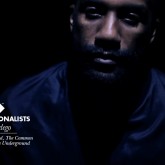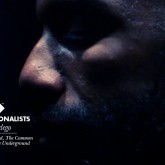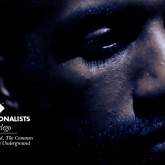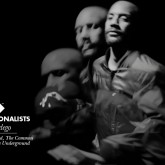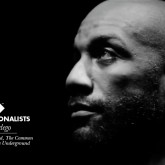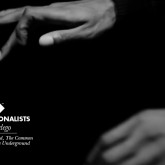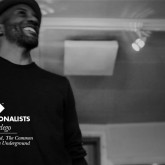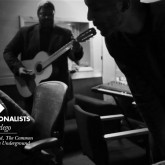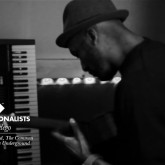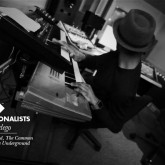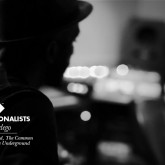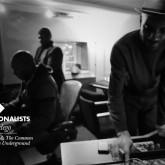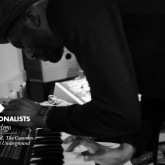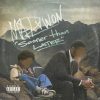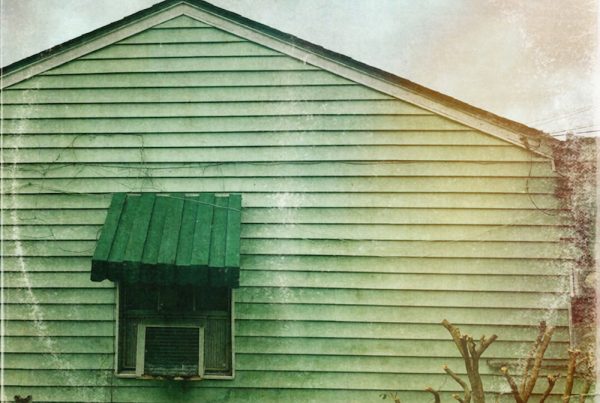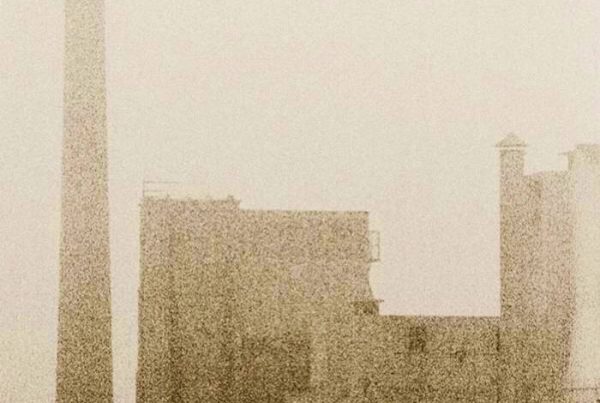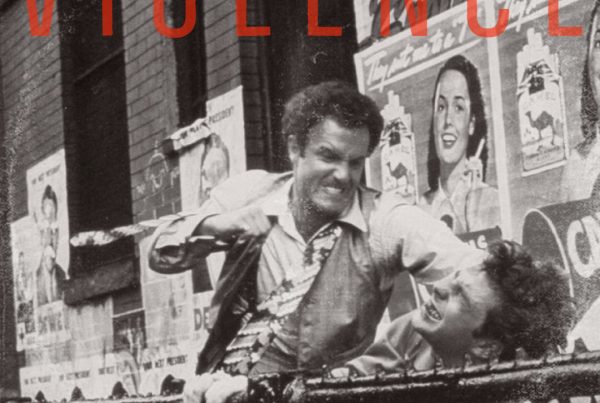Last December, I had the opportunity to record and, with the help of my friend Daniela, transcribe a candid conversation I had with dego. This was a few short weeks before he moved back to London, after spending the previous 5 years living in Brooklyn, and several months before I moved to Los Angeles, after living in Brooklyn the previous 6 years.
I didn’t discover dego’s music for myself until my freshman year at Rice, when a friend, and eventual roommate, let me rip a Giant Step promo CD that had “Star Chasers” off 4hero’s 1998 release Two Pages on it. From there, it was the inevitable fall into the sphere of raves, jungle, drum n bass, broken beat, nu jazz, downtempo and all matter of, at the time to me, odd sub genres emanating from the British Isles.
Having not really paid any attention to music from Britain since moving from Reading to Texas in 1992, this was a good time for me. Tribe had just broken up the year or so prior, Slum Village’s first album hadn’t been officially released domestically, Roc-a-fella Records, Ruff Ryders & Murda, Inc. were ruling the air waves and not my cup of drank, all the girls I liked loved whichever boy band was ruling the charts that week, Ishmael Butler’s (Shabazz Palaces) Ishmael Since 1999 album was shelved (I was a huge Digable Planets fan…aaand then he ventured off entered his Cherrywine era *barf*), The Roots released Phrenology and I was desperately looking for something new to listen to; I could only run Midnight Marauders and my many video game soundtracks back to back so many times.
New York being the smallest, big city in the world, our paths eventually crossed as relatively like minded music nerds (a polite way of saying that we’re often dubbed haters). I was introduced to dego via DJ Brainchild I believe. Or maybe via Filthy, who then was J*Davey’s manager. My memory is hazy, and I’m not completely certain. That initial (DJ Brainchild) introduction resulted in a collaboration between dego and Wayne & Erica (The Luv Bugz) for his album A Wha’ Him Deh Pon that was premiered here on Rappers I Know. “Whatever” is one of my favourite songs they’ve been apart of that Wayne didn’t produce himself (Tweet Ali Shaheed Muhammad right now and ask him where their collaboration is at).
For the uninitiated, who were later than even I was to jungle & drum n bass, missed all the great groove centered records coming out of London the last decade, and have no idea who dego, 4hero, silhouette brown, Bugz in the Attic, DKD, 2000black are, I suggest listening to this refresher course that DJ Brainchild mixed, It’s All Over The Place, while reading along.
Our conversation covers a lot of ground, and beats a few dead horses as well. At times reads angry, critical and jaded, yet certainly sounded a lot more jovial and fun as it was happening. This is part 1 of the full conversation and the first of an all new section, Conversationalists, I plan to update whenever I have a conversation worth recounting.
dego’s new album Tatham, Mensah, Lord & Ranks with Kaidi Tatham (Bugz in the Attic/Agent K), Akwasi Mensah (Agent K) & Matt Lord (Bugz in the Attic) will be out soon. The video for their first single “Mr. Pickles” dropped a few days ago. You can watch that here.

FWMJ: So you’re moving back to the UK in a few weeks?
Dego: Yes.
F: Is there anything that you feel you’ve left unfinished here in New York music-wise?
D: Uh, no.
F: (laughs)
D: There’s nothing going on in New York music-wise. There’s nothing unfinished because there’s nothing happening.
F: Tell me a little about what you’ve been working on the last few months.
D: I’ve been working on this album that you’ll be doing the cover art for, as well as working with some other people.
F: Can you name any of those people or is it all top-secret?
D: I can’t really name them, actually. I can tell you off the record, though.
F: In the sense that nothing musically is going on in New York, has New York, and I guess to a greater extent the United States, been a disappointment in any sort of way?
D: Uh, yes, it’s been extremely disappointing.
F: What were your expectations?
D: Well, here were my expectations: I thought, “Well, the first time I came to New York was in ’91, so I missed the great age of the 80s where all the many different forms of music were started and on the ascendency” – after the end of disco when there was the birth of hip-hop and things were going on in New York. New York had that edge, you know? So that’s the kind of – my kind of romantic recollection – that I hoped to get back at. I wanted to find that vibe and be in that space. And I knew obviously it wasn’t going to be the same since New York has changed dramatically since those days, but I still hoped there would be some of that raw energy and some of that creative buzz, and that willingness to contribute and progress out here, you know? I was hoping for that when I got here.
“If you’re driven just by fame and wealth, then the worth of what you’re going to make has to appeal to the common denominator. And no great art form, as far as I’m concerned, has ever been great when it appeals to the common denominator.”
F: And when was that?
D: I think … 2008? And I think I’ve finally come to realize that, after living here properly rather than making trips back and forth, that there’s nothing actually happening here. There’s not really anything. There’s no scene per se. I think the last type of era was probably around the independent rockers and hip-hop days, and those kind of labels running around. Then of course you had the big electric street-rhythm vibe in the 90s. That’s probably the last era of any real scene going on. And I find the only scene that seems to be progressive in doing its thing here in New York has been the indie rock scene. And the indie rock scene is none of my business. It doesn’t mean anything for me because it’s not my thing, it’s not my calling. I do like some of it, but, you know.
F: What do you think has contributed to the absence of there being a scene, and for lack of a better term – or maybe there is no better term – for black music in New York City? What’s missing? Personally to me – not to interject too much on what I’m feeling – but it feels to me like the undead of what used to be going on in the 90s and the 80s – like a zombie version; no real heartbeat.
D: I think there are many, many different factors for why it’s gotten like this. No. 1: when it was really flourishing and so on, New York was broke. So there’s always that feeling of when people ain’t got anything, then they will – with minimal resources – become very resourceful and creative. So there’s a case of that, probably. Also, sometimes due to the success of things that happened in the past, I feel that people were too quick: they looked at the pinnacle of things and they weren’t doing things for the sake of doing it, for the true love of, “Oh I being a vocalist, I love doing this, I don’t care if I make money out of it or not, I love doing this and I’m going to work at this craft.” The same with any musician and so on. But now, we’re in this age where everybody is a one-man corporation, and it’s not just about the art. People now are like, “Oh I like rap,” but they never really, truly, loved it.
If you really, truly, loved it, you would search it and you would practice at it – and this, that, and the other – as you would with any other kind of music, and I feel that people – they get in this thing “because”: we’re in an age now where people do things just to be famous. And just for money. While other people really do things for whatever their particular art is. I think a lot of it now is built on fame and wealth. If you’re driven just by fame and wealth, then the worth of what you’re going to make has to appeal to the common denominator. And no great art form, as far as I’m concerned, has ever been great when it appeals to the common denominator. If you do great art, and then by chance it happens that everybody likes it, that’s great. But if you from the get-go are thinking, “Alright, I gotta do this because this is gonna be hot and everyone’s gonna like it, or this is what people are into,” then it’s never gonna be great. It’s just gonna be . . . whatever
“In America, you’re not allowed to be different. You’re only allowed to be different if you’re very, very successful.”
F: Right. So does that make you elitist?
D: Yea, I’m elitist. I’m a snob! And I make no apology for it. If you’re gonna do stuff then do it properly, otherwise—fuck-off. It’s a joke out there. I don’t do rap, okay? I did do rap, when I was younger, but I was enthusiastic about it, I loved it. But I got to a point where I was like, “I’m no good at this, let’s forget about it.” But I’m glad I done it because that’s how I learned to write songs. But when I was doing it, I still knew about so and so’s rhyme from this and that time, and I knew about who did that kind of style, and changing patterns, I knew about all that kind of thing because I loved it. I didn’t do it because I wanted to wear a certain type of jacket and be on the front cover of a magazine. It’s just like, what is your motivation for doing these things? Most of the great artists in the world, their motivation is not fame. They got into something because they truly loved it, whether you’re making dresses, or you’re painting pictures, or whatever it is – people usually do these things because they love their craft, and they try to get to learn their craft as best as possible. But people nowadays, they don’t care about their craft. They’re just about how they can get to be recognized and have their fifteen minutes or whatever it is. And it’s gotten out of hand. It’s gotten out of hand, you know what I mean?
F: Yeah, I don’t disagree.
D: It’s really ridiculous, you know? And I think that’s not just the case in New York, that’s a lot of the case around the world. But New York . . . I mean, where is the space for people to be different and be creative? Because in London we’ve always got these little scenes you know. Every five minutes we’re reinventing ourselves. Drum ‘n’ Bass, House ‘n’ Garage, Dubstep…forever reinventing stuff. It’s the same shit usually, most of the time – you can’t make anything really new – but you can tell people are trying to evolve all the time. There’s always that space for doing that kind of stuff. We’ve got pirate radios, and quite a few legal stations where you can get your stuff heard if you’re doing something progressive. So there’s always this different vibe and flow going on all the time in England.
In America, you’re not allowed to be different. You’re only allowed to be different if you’re very, very successful. If you’ve gone Platinum, you can do what the fuck you want. But if you’re not and you’re coming up, and you do shit different, and you ain’t got that co-sign, you’ve got nothing.
And that’s the other thing: people are like sheep. Nobody’s got a mind of their own anymore.
“Do you like this?”
“I like it, my friend doesn’t like it.”
“Cool, I don’t give a fuck if you’re friend doesn’t like it, because I know my stuff and this appeals to me, so I’m gonna follow this route.”
But now, it’s a herd mentality. Until certain people say it’s cool, it’s not down. Like, when [Justin] Timberlake does a drum beat [in a certain way], then it’s cool. If a kid from Norwich in England does that drum beat, then it’s like, “What the hell’s that nonsense.”
F: I think that’s one of the things that I struggle with when listening to new artists. When I can listen to a song or three and immediately realize that you don’t know yourself as a person – I can tell that you don’t know what your motivation is to make music or to make art; other than that you’re not terrible at it, and you’ve figured it’s the quickest way to get people to recognize you. There was a point way early in my life where people knew me so I got that out of my system already – not that I’m a performing artist at all, but if I was, I don’t think I would do it because I want girls screaming at me when we get off the tour bus.
So you just listen to some of these songs and whatever the underlying current of their narrative is, it’s just like . . . for example – there’s this rapper. I’ve met him several times, every single time, to him, it’s been the first time he’s met me. And it’s been in – not situations that were necessarily instrumental to his career – but I’ve introduced him to people that he still carries on relationships with, like DJ Enuff and Angie Martinez, and Miss Info; all clearly when I was at the station. And the only thing that dude raps about is, “I like sneakers and street wear,” and that’s it. And if you look at that, he’s maybe recorded and released like 60 songs that maybe people have downloaded and listened to and put on their iPods, and he hasn’t really said anything. How is it that your first major single is with the biggest pop artist of the day and you don’t get on. Like, how do you do a song with a huge pop star and don’t blow up? It’s because you’re a shell. You look like a rapper – a lot of these new acts look like rappers and act like rappers, they’re imitations of what their older brothers and sisters were listening to – but it’s without the context. But anyway, enough bitching and moaning about that.
So you have this record you’ve been working on the last couple of months and some other stuff you’ve been working on that you can’t name on the record—you keep threatening that you may just give up music all together: is that a serious threat or is that just you being you?
D: No, it’s serious. I think I’m getting to an area where I don’t want to do it full time.
F: What would you do with the rest of your time?
D: I don’t know, try to earn a living somewhere. But it’s like, I’ve been doing this for a long time and I see how it’s going, and for me to continue doing it I have to do certain things which I am not prepared to do, so I’ve got to be realistic with myself.
F: 808 drums and Chris Brown collaborations?
D: (laughs) I don’t mind 808 drums, but it’s gotta be under my terms. It’s just, I am an underground artist and I think I’ve done very well to survive and done the things I’ve done all these years. But at the same time, it’s swamped. The waters are swamped with loads of people, and that phrase of “The cream rises to the top” is a load of bullshit. That’s not the case.
F: Because there’s not a lot of cream that’s at the top.
D: It’s just nonsense. It’s a farce. People have gotten too used to certain things that they can’t recognize. And it doesn’t have to be me, I’m not talking about me, like, “Oh man, my shit ain’t rising no where.” It’s not about me. It’s more, “If it ain’t me, then, let’s see what is rising. There must be some things that I’d like because it’s the baddest ones of the underground.” Because the underground, allegedly, originally, used to be like, “We ain’t in no politics bullshit – it’s how good you are.” That’s where I come from. There it really is about the wax—how good you are, not who you are. And even in the underground I’m disappointed by people. I’m disappointed by some people’s motivations and reasons for why they play certain things and so forth.
F: The age I started actively participating in music was the whole Rawkus, underground, indie hip-hop era in the late 90s—early 2000s. Of course I was listening to rap music before, sneaking CDs and tapes things out of the store because I was too young to buy parental advisory records. Everybody’s always had this thing about being independent, being an independent artist, and I think the definition and the implications of what being an independent artist is nowadays is much different than what it used to be. Like the indie rock thing – and I guess it’s the same across all genres – now indie rock is a genre, but these are just indie-sounding bands on major labels.
So I find it interesting, your comment about the underground isn’t necessarily about who is the most talented and doing the best work, the underground is plagued by the same problems as the mainstream as far as needing co-signs and who is doing whose music, and who is collaborating with who. It’s no longer that you want to test your skill or display your skill in a creative way – it’s still industry in practice and motivation.
D: It’s funny how on the alleged underground level that it’s still very corporate. It’s still there. But I hark back to a dead era when it wasn’t that way, when things really were about how good you were. And what I wonder about are the people who allowed that corporate system to be an influence and be what it is inside that space. So I find that very, very disappointing, you know? Especially when you can see certain DJs who actually know about this, that, and the other are just playing the game, quite obviously, but still pretending to be underground/independent. I mean, I don’t mind: be that way and call it what it is, but don’t pretend you’re still coming from the heart like hell. There’s a load of people like that.
F: That was definitely one of my issues working at the Death Star at Hot 97, and talking to a lot of the DJs and on-air personalities who know what’s really real. But it’s not the good music business, it’s radio business, and it’s meant to drive advertising and drive listenership with [music of] the lowest common denominator. So of course I went up there all wide-eyed and bushy tailed and thinking, “Oh I’m gonna change the world, there’s gonna be underground music all day, or at least creative music, and give that a fair shot or a level playing field.”
I feel like I changed the culture up there a little bit amongst the people I talked with on the daily. For example, I got DJ Enuff to play Black Milk’s [Give The Drummer Sum] on the air during a prime time hour, not in the middle of the night. He even played D. Rose & DJ Cosmos once or twice during the rush hour. But you know, it’s one of those “Lets give the hungries some crumbs. We’re still saving the big steak for Young Money radio; Drake or Lil Wayne or Nicki Minaj back to back to back for five hours straight, but maybe we’ll throw a Trey Songz or Beyonce song somewhere in there to mix it up.”
D: It’s a sad state of affairs.
F: Well is there anything else out there musically going on that you actually like? Because I know that most of the time I get to the point where I just listen to old music, or if I made beats myself, stuff I would sample.
D: I still listen to a lot of old music because I’m still discovering a lot of old stuff and that to me is like finding a new record, innit? — it doesn’t matter to me if it was made in 1973. So yea, I do still listen to a lot of old stuff. New things; there are a few things, a few people I listen to, but then I’ve almost got to this stage where I’m like, “I don’t care to listen to anyone’s new stuff.” If I come across it, fair enough. But I’m so sick and tired of being disappointed with people telling me, “Check this out and check this out.” I’m so tired of listening to stuff and thinking, “This is nonsense.” I can’t be bothered to take a conscious effort to go and seek out new music anymore.
If people send it to me, cool. But me, I used to always fish in life – let me go find some stuff and speak to people and go to stores and all that. I don’t care anymore, I don’t care. And I don’t mean to be a bigot, but I can make anything that you or anyone anywhere can make, I can just make it myself, so why do I want to listen to them doing it for? So that’s just how it is right now: I just don’t care. You know what I mean? Whatever. So there are a couple of people making some beats that I like here, definitely, but I can count them on one hand.
“I don’t know what being patriotic means. … I was born there, and people’d tell me to go back to my country. So I don’t understand it. Go to Jamaica and people call you ‘English boy.’ So I’ve never understood patriotism.”
F: You were back home during the riots: what did you think of all that?
D: Which ones? Oh, the London ones? These things at the end of the day are a consequence of how the world’s turned out. And there is that big, big, big divide between rich and poor. And you know, we have this Occupy thing that’s happened recently, but these London riots – that’s partly the same thing. It’s this gap, this gaping gap that’s happening, and that’s a result of it: frustration. Youth unemployment in England is ridiculously high. You come out of school, and you have nothing to look forward to. There are no jobs. But at the same time, we’ve got all that happening, and then we live in this world where it’s about how much you’ve got, and the bling bling, and it’s very materialistic compared to bygone eras really, you know what i mean? So with that all going on, and kids don’t got no money or anything, this is what happens. Everything that’s celebrated in life is about fame and wealth.
F: That was my next question: how do you think a lot of that ties into the Occupy protests here in the States? The underlying theme or current with the Occupy stuff I see is a) that huge disparity between the wealthy and everyone else in the country, and b) feeling powerless to do anything about it so “we’re going to go sit in your front lawn until you get sick of us”, versus other countries or places in the world where people are actually like, “Oh, well, we’re not going to try to convince you to give back some of that money that you probably illicitly gained at our expense, so we’re just going to destroy stuff that belongs to you.”
D: Well, a lot of that is just young people’s frustrations. There were older people in those riots in London, but most of that is just proper frustration and angst coming out.
F: Well, Arab Spring and all these overthrown “dictators” in the Middle East : all over the world people are over it.
D: Well the thing about being in power is the duty that comes with it to serve the people. And that’s gone. That’s dead now. Now the politicians serve corporations. They serve whoever has the most money and will promise them a job after they’ve finished working in politics, whoever can bribe them the most. It’s not about that whole moral idea of, “ I want to see my country be better.” There used to be that mentality of being patriotic.
I don’t know what being patriotic means. My parents come from Jamaica, I was born in England, I grew up in a time where people call you “nig-nog” and “nigger” and stuff in England because they weren’t used to black people being there. I was born there, and people’d tell me to go back to my country. So I don’t understand it. Go to Jamaica and people call you “English boy.” So I’ve never understood patriotism. I don’t know what the fuck that means. But to me, if you’re patriotic, I would think that would mean that you love your country and you want to see your country strong and in a better place, and to love your country means you must love all the people that are in it.
So if I’m patriotic and all this stuff, then I would want to see the next man down the road to be able to provide for his family and his children have good prospects and so on and so forth. But, nah, people hide behind being patriotic, but really they’re just selfish because it’s all about me, me, me and wealth and I gotta hang on to this.” You can’t think like that. And then you start stating opinions and people throw words around like “socialist” – and that’s a bad word in this country, it’s on par with saying some crazy, satanic type shit just by saying that stuff. But no, other people are selfish and sometimes things have to be done for the greater good, and unfortunately around the world the people are not served.
F: Well, here’s another thing I find interesting because there are people who will feel the exact same way when talking about everyday life and society in general, but then when it comes to their music . . .
D: Can I say something? Rappers: they can go fuck themselves. The lot of them. They can fuck themselves. We’re at a time where there’s so much to fucking talk about. You have so much to rap about right now. It’s amazing.
If Chuck D was 21 right now he’d be saying “Oh my God I’ve got my next five albums done. Lyrically, I’m done.” And none of these fuckers say nothing. Because they’re all caught up in that materialistic bullshit.
F: Yea, I find it a little disappointing.
D: A little disappointing?! A LITTLE disappointing?! A little disappointing…



